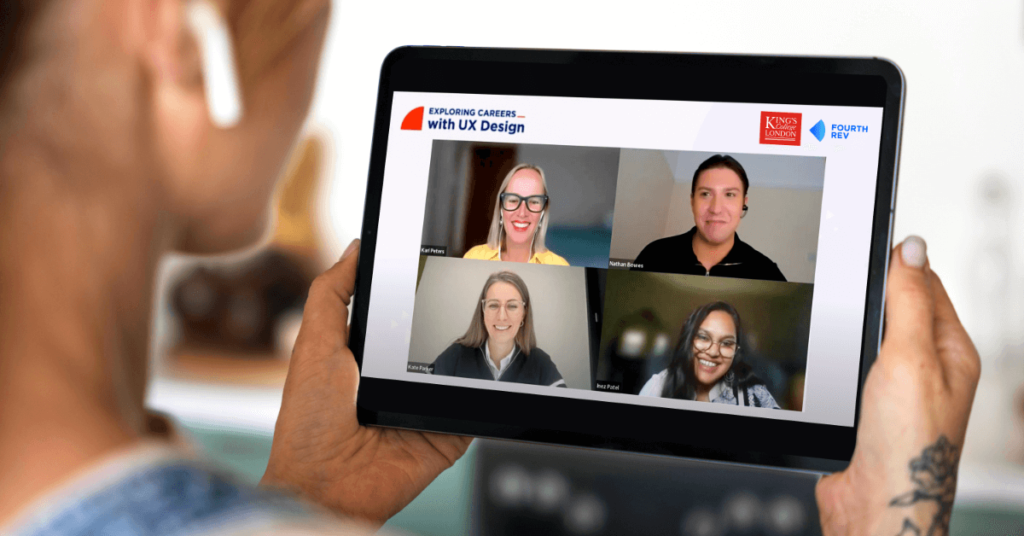
UX is an exciting field to work in, and according to the Bureau of Labour Statistics, employment opportunities are growing. Between 2021 and 2031, the number of UX design jobs is projected to increase by 23% as companies around the world compete to provide the best digital experiences.
“There’s certainly a huge growth in the acknowledgement of the impact UX design can have on businesses.” – Tilly Guess, Lead Product Designer at Rightmove
So, if working in UX is something that interests you, now is a great time to explore it as a career option. But where do you start?
We’ve hosted a series of webinars with UX experts from around the world to answer questions about how to launch a UX career and set yourself apart as a candidate employers are eager to hire.
You can catch up on the full recordings of these webinars here:
Discover UX design career paths
Break into UX design
How to stand out and get hired in UX
Key takeaways from UX experts
You’ve got more transferable skills than you think
“There are quite a lot of transferable skills that everyone will likely have from their previous jobs. And these are usually the soft skills, which are the most important for UX because the reality is there’s only one super hard skill. And that’s the actual designing… This is a hard skill, but it’s not, you know, nuclear physics, it can be learned. And if you are naturally creative or skilled in the art, it can help you pick it up quite quickly. It’s not a deal breaker.
“The four key sets of soft skills I look at are:
- Communication and collaboration: You’re almost always working within a team, so you need to work together with other people to make decisions. And you’re going to be constantly pitching your ideas to stakeholders, so you need to be able to communicate what you’re designing.
- Creative and critical thinking: You’re going to need to think creatively and critically to solve problems because, at the end of the day, what you’re doing is creating experiences that help people solve their own problems and achieve their own goals. And it’s likely that you’ve probably done critical problem-solving at your previous job. So maybe you improve sales or customer experience, but you didn’t necessarily use UX to solve that part.
- Empathy: Anyone that’s read a little bit about UX design would know that this is very crucial. If you’ve done any kind of design thinking, using the kind of designer mindset to approach problems or any research, that could go a long way. I know a lot of people don’t have this experience. But that’s been a real plus when I’ve looked at people to hire in the past.
- Being adaptable and open to feedback: You cannot get attached to your work – you’re not doing artwork for yourself. You’re designing for the end users, so you need to be prepared to constantly iterate and change based on either their feedback or changing business needs.” – Justin Hrabec, UX and UI Subject Lead at FourthRev
Your work is multi-faceted
“No one day ever looks the same. And that’s what makes it so exciting and interesting. If we take it at a broad level, a product manager will be trying to understand what to build, and you, as a UX designer, will be trying to figure out how to build it. A lot of your day-to-day work will be focused on getting to know the motivations and behaviours of your users and then understanding the logic and the feasibility of user flows working from end to end. For me, UX Design is actually more about thinking and problem-solving than it is about design – that’s often the last component of the process. Your day-to-day will involve a lot of communication because you’ll be working with a lot of different people, stakeholders and customers.” – Kate Parker, Head of Product Design at LSG and a contributor to the King’s UX & UI Product Design Career Accelerator
Be inspired by your interests and document everything
“Everything in anything is available for you online. Go on tools like Figma and start doing your own mini projects. I’d take on any websites you think could be improved, put together some user research – ask your friends what they think about the website, and then create some low-fidelity, high-fidelity mock-ups and prototypes. Show what you’re passionate about – it doesn’t necessarily have to be professional work. I’ve got a lot of little fun projects that I’m really passionate about, like, I love Spider-Man. So whenever a new Spider-Man film comes out, I’ll work on a little website based on Spider-Man.” – Kevin Auyeung, Lead Product Designer at Toyota
Your network is a powerful way to get information
“I think it’s handy to reach out to people. I know that when I was moving to a new country, I had no idea what the UX research salaries were like. I didn’t know what the cost of living was. So besides looking at PayScale, and Glassdoor, I just was bold, and I reached out to people on LinkedIn. I asked about what the different ranges were from research managers to research directors to researchers themselves, UX designers and UX directors and just really got a good idea within my network. I’m so glad I did that because networking like that opened up a lot of doors. – Kari Peters, Director at the UX Research Institute
Bonus: Go-to UX design resources
We asked our panellists from this webinar series to share what books, podcasts and websites they’ve found helpful for their work. Here’s what they had to say:
Tilly Guess
- Design Matters podcast
- Medium
Justin Hrabec
- LinkedIn communities
Kate Parker
- NNG has everything you need for the practical side of things
- A general following across TechCrunch to see what going on across multiple industries
- Any and all books about strategy and change
Kevin Auyeung
Launch your UX design career
If you’re set on moving into product design, the King’s UX & UI Product Design Career Accelerator might be the programme you’ve been looking for.
Co-designed by faculty from King’s and industry leaders from companies like Creative Navy, Dropbox and Atlassian, you’ll gain relevant knowledge that will help you secure a UX role, fast. Supported by a dedicated Career Coach and Success Manager, you’ll set career goals that set you up for success during your studies and as you advance in your career.
Download the programme brochure and book a call with an Enrolment Advisor today.



